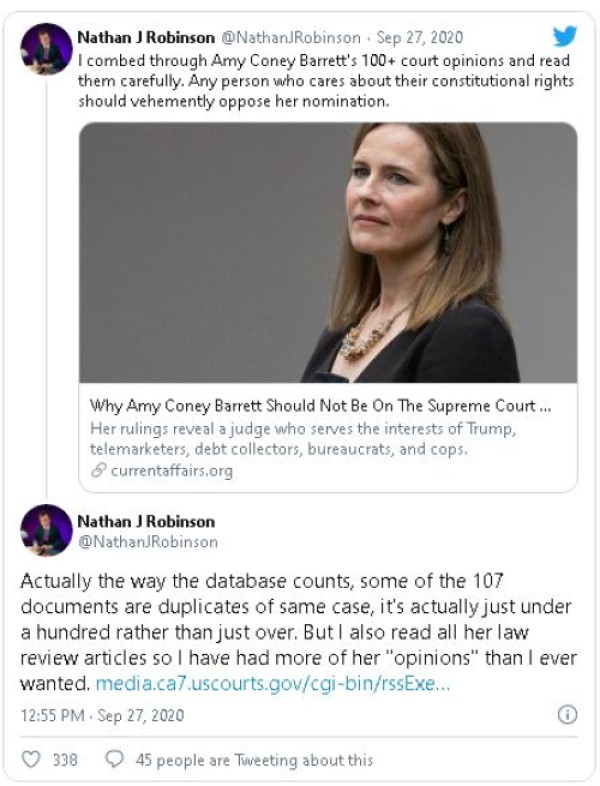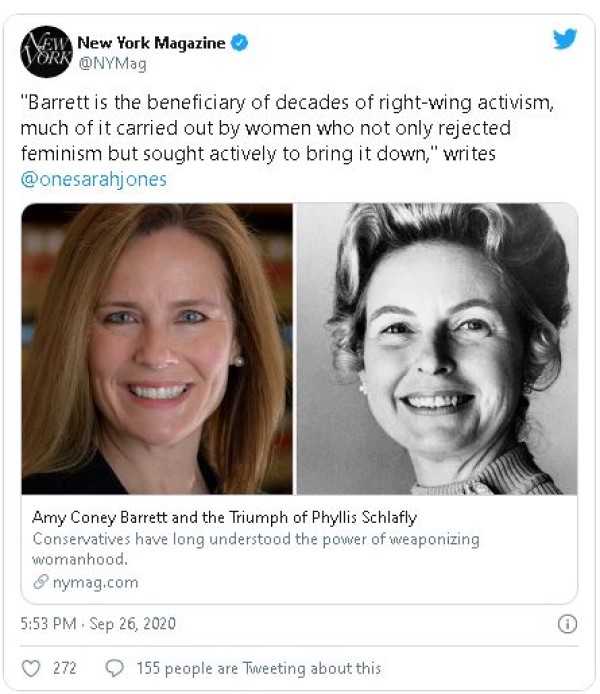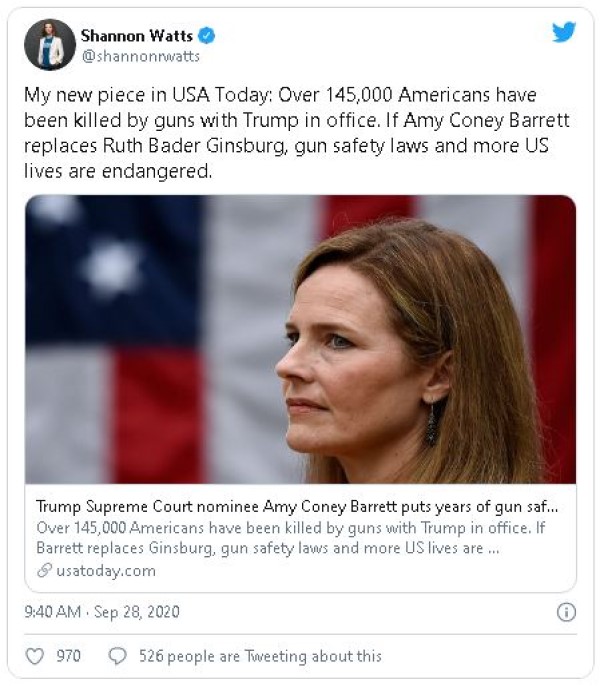|
Since
President Donald Trump on Saturday confirmed
reports that he is nominating Judge Amy Coney Barrett to replace the
late
Justice Ruth Bader Ginsburg on the U.S. Supreme Court, warnings have
mounted from progressive critics who argue that Barrett's right-wing
ideology and judicial rulings should be disqualifying.
"On
the court, she is likely to issue rulings that cause significant
needless harm to innocent people and make the country a more unjust
place, with rulings that erode the rights of workers, immigrants,
criminal defendants, and, of course, those who need abortions," Nathan
J. Robinson wrote for Current Affairs after examining the 7th Circuit
judge's past opinions and public statements. "Sometimes her opinions have been downright cruel. They disqualify her, full stop."
Although,
as Robinson acknowledged, "Barrett's judicial record is actually
relatively limited," he highlighted some specific examples, from her ruling
that a man who feared he would be "tortured by gangs or corrupt
government authorities" in El Salvador didn't qualify for a deportation
exemption to her dissent in a case where two prisoners were suing the
federal government after being shot by guards. As Robinson detailed:
Barrett
has also ruled against workers attempting to launch class action suits
over wage and hour violations, customers seeking to enforce a company's
warranty after buying a disastrous malfunctioning lemon of an RV, a
prospective candidate looking to reduce barriers to ballot access, a
city employee trying to get his pension, a consumer pestered with texts
from AT&T in violation of the Telephone Consumer Protection Act,
workers who hadn't been paid for the full time they were on the clock,
a woman whose IUD broke off inside her, possibly leading her to need a
hysterectomy, Grubhub drivers pushing for minimum wages and overtime pay,
a debtor whose debt was not confirmed to be accurate by the debt
collection agency, and parents whose hockey player son was prescribed
drugs by NHL doctors and then died of an overdose.
Given
those and other cases, Robinson warned that "her rulings reveal
a judge who serves the interests of Trump, telemarketers, debt
collectors, bureaucrats, and cops."

Some
critics of the Republican effort to confirm Trump's third appointee
to the high court before
November 3—even
though early in-person and mail-in voting has already started—have
focused on Senate Majority Leader Mitch McConnell's (R-Ky.) refusal
to follow his made-up standard from 2016 for election-year Supreme
Court nominees.
Senate
Minority Leader Chuck Schumer (D-N.Y.) has thrown McConnell's words
from 2016—when he blocked a vote on Merrick Garland—back in his face,
though Schumer and other Democratic senators are under pressure to wage a real fight against the attempted GOP "power grab" by using all procedural tools at their disposal.
Other critics of Barrett, such as Robinson and Sarah Jones writing Saturday for Intelligencer, have instead drawn attention to concerns about the potential national consequences if the 48-year-old former clerk of the late Justice Antonin Scalia is confirmed by the GOP-controlled Senate to a lifetime appointment.
Challenging the "old trick" of conservatives advancing women to key positions so they can claim
critiques from Democrats and progressives are sexist, Jones warned that
"a Supreme Court justice with right-wing perspectives on labor, the
environment, immigration, and criminal justice can harm women from all
backgrounds in all aspects of their lives. That is the intention, and
not the accidental byproduct, of constitutional originalism. As
embraced by jurists like Barrett and her old boss, Antonin Scalia,
originalism is its own dogma; the extension of a political theology
committed to an older and more exclusionary version of America."

While
Robinson and Jones highlighted the myriad of rights that could be at
risk if the GOP succeeds in pushing Barrett through, some activists
and groups have shared more issue-specific warnings. In a Monday
memo, Planned Parenthood Action Fund declared
that if Barrett makes it to the nation's highest court, Roe
v. Wade—the
landmark 1973 ruling that ensures the constitutional right to
abortion—"will be rendered meaningless before it's ever
overturned."
Noting
that state lawmakers have enacted over 480 restrictions intended to
limit abortion access since 2011, the group explained that "right now, 17 abortion-related cases
are one step from the Supreme Court—most of these involve incremental
restrictions that effectively ban abortion, without the need to
overturn Roe. These incremental bans, combined with 'trigger laws'
designed to immediately ban abortion if Roe were to fall, and with over
20 state legislatures hostile to reproductive healthcare, means that
what little is left of abortion access could be eliminated for an
estimated 25 million women of reproductive age with Barrett on the
Supreme Court."

Shannon
Watts, founder of Moms Demand Action, pointed
out
in a Monday op-ed for USA
Today
that "the gun safety movement has made unmistakable progress at
the ballot box, in statehouses, and in Congress" since she
founded the group in the wake of the Sandy Hook Elementary School
mass shooting in December 2012.
However,
with Barrett's nomination, "all of that progress is at risk,"
warned Watts, who is also a board member of the Supreme Court Voter
project. "The president's decision to try to ram through a new
Supreme Court justice while early voting in the most important
election of our lifetimes is already underway—and his selection
of a judge with an alarming interpretation of the Second
Amendment—lay bare just how high the stakes are for the gun
safety movement."
Failing
to stop her confirmation, Watts continued, could be deadly. With
Barrett on the bench, she wrote, "the coming years could bring legal
decisions that threaten to undo decades of progress for public safety. Over 145,000
Americans have been killed by guns with President Trump in office, and
if he succeeds in appointing another opponent of gun safety laws to the
court, even more Americans will die."

E&E
News
noted
Saturday that "Barrett's record on environmental and energy
issues is largely undeveloped, but several environmental groups
voiced concern about Barrett's narrow view of public interest groups'
power to sue in opinions she wrote as a judge for the 7th U.S.
Circuit Court of Appeals, where she has served since 2017."
Brett
Hartl, government affairs director at the Center for Biological
Diversity, said in a statement last week that "her slim judicial
record shows that she's hostile to the environment and will slam shut
the courthouse doors to public interest advocates, to the delight of
corporate polluters."
"Environmental justice, our climate, and wildlife on the brink of extinction," he warned, "will all suffer if Barret is confirmed."
This commentary was originally published by Common Dreams
|

